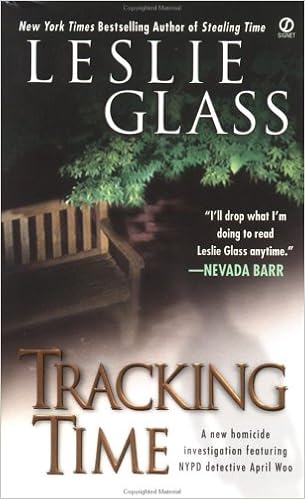|
Leslie Glass, Tracking Time (Signet, 2001) Tracking Time is a part of author Leslie Glass' Time series, featuring NYC police detective April Woo. If you're a fan of the series you already know you want to read it. If you're new to the series, like I am, this book may not be the best place to begin. The relationships among the recurring characters seem well-established, and Glass assumes a knowledge of some of them that's hard to decipher for a new reader. What's a disadvantage to a new reader, though, may well be an advantage to returning ones; they won't have to wade through the exposition of things they already know that can get tedious when they're already familiar with it all.
This novel was not entirely successful at either goal, though. Although the characters were confusing initially (partly because of my unfamiliarity with the other books in the series), they resolved into simplified types rather than people. Details about their appearances, feelings and actions did not seem to reflect an underlying whole and did not serve to illuminate their characters as they ought. While Glass wrote from quite a few points of view, she didn't seem to me to have imagined herself into their skins when she did so. In some ways the lack of connection I felt with the characters was true to one of the themes of the book: the lack of connection between people, even family members, and the problems aggravated by this. Glass offers detail, maybe even too much detail, but it all seems like cold facts and the characters don't come to life. While I can respect this as an aesthetic decision, if that's what it was, it makes the novel less attractive. One should have affection at least for the main character, I think. This lack of connection was worsened by the number of points of view in Tracking Time, including segments written from the point of view of all the major and many of the minor characters, as well as some authorial omniscience. This was confusing and added to the disjointed effect. It's harder for an author to choose a small number of POV characters and relay information only through their eyes and minds, but it usually makes for a more coherent and emotionally resonant result. The plot was also somewhat confusing. The activities of some aimless and unsupervised teens were important to it, but many of their actions didn't make sense to me. Granted that this was one of the points -- their actions didn't make much sense to themselves either, except in obvious plot progressing ways -- but the new twists too often had me saying "Huh? Where did that come from???" Relying on irrational behavior blamed on drug use is, I think, as much a cop-out as using insanity for the same purpose -- and it begs the point, since even behavior that looks the most irrational to an observer does spring from thoughts that seem rational to those who have them. Glass has some interesting potential in her recurring characters, especially April Woo and the various culture clashes in which she lives her life. Perhaps these are explored in other novels in the series. Tracking Time is an eventful novel that touches on weighty issues but does not delve into them enough to be emotionally disturbing (a mixed blessing). It's a reasonably entertaining read, and I do recommend it to those who follow the series, but reiterate that it did not seem to me a good choice for one's first novel in that series. 
|
 Rambles.NET book review by Amanda Fisher 8 December 2001 Agree? Disagree? Send us your opinions!  



 |

